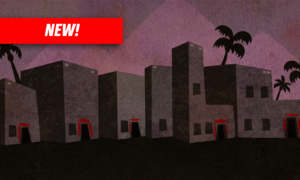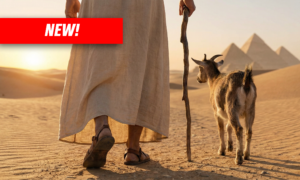Sicha 24 Teves 5741
25 Iyar 5743
And Rosh Chodesh Shevat 5741
Closure of the Mikvah
The first of the plagues in Egypt turned the waters of the Nile to blood. Rashi explains that the Egyptians worshiped the Nile, thus G-d struck their G-d (Source 1). The Jews profited from selling water to the Egyptians (Source 2).
Behind the persecution of the Jews lay the Egyptian fear of the high Jewish birthrate (Source 3). To prevent births, the Egyptians forbade the Jewish women from immersing in the river. G-d punished them by turning the waters to blood (Source 4).
The Rebbe explains this was an ingenious decree. Outwardly, they hadn’t forcibly controlled the birthrate; they’d merely shut access to the water source, thereby cutting the birthrate.
A High Birthrate
The Talmud states that the Jews will be redeemed when all souls are in bodies (Source 6). Thus, in addition to the great mitzvah of being fruitful and multiplying, this has an added relevance for our generation: this is how we can bring the redemption.
To have children, we must conquer their feelings of personal comfort. Yes, it costs a lot, childrearing isn’t easy, and life may not bring the same pleasures as before. We must express the inner desire of their soul and put aside the body’s concerns.
Eventually, we will conclude that these were unfounded concerns because blessing comes from G-d, and when they create a “receptacle” for those blessings, G-d gives even more.
Young Miriam’s Courage
The Egyptians worked the Jews bitterly (Source 7) to break their spirits and crush their dreams of family and tranquility (Source 8), but the women managed to bring new life into the world under unbearable conditions (Source 9).
When that failed, Pharaoh ramped up the decrees and commanded to throw all newborn Jewish males into the river (Source 10). Mass divorce broke out among the Jews, and Jewish continuity was in question. Young Miriam, however, persuaded her father to remarry her mother, and the rest of the Jews followed suit (Source 11).
Logically, it would have made sense to reconsider having children at that time, but the Jewish women operated beyond the dictates of logic; they had trust and faith in G-d. As a result, Moses was born, and he went on to lead the Jewish people out of Egypt.
The message: Don’t overthink having children, just do it.
When I Wanted to, You Didn’t
Moses encounters G-d at the burning bush and hides his face, “For I am afraid to look at G-d.” (Source 12). A year later, Moses pleads with G-d “Show me Your glory!” and G-d answers “You cannot see My face.” (Source 13). The Talmud comments: G-d told Moses “When I wanted to, you didn’t, now you want to and I don’t.” (Source 14)
The Rebbe cites this Talmudic passage with regards to family planning:
There are three partners in the creation of a child: the father, the mother, and G-d. The initial step must come from the mother and the father, but the results depend on the third partner – G-d. He knows the best time for giving birth, for both the child and the parents.
Often, parents believe it’s not a good time to have another child; it’s better to delay. We must take to heart G-d’s words to Moses: “When I wanted to, you didn’t, now you want to and I don’t.”
When we trust in G-d, Who knows the present and the future, He will choose the best time for another child. When we don’t trust in Him and we involve our personal concerns, then it follows the limited human schedule, which doesn’t always pan out.






